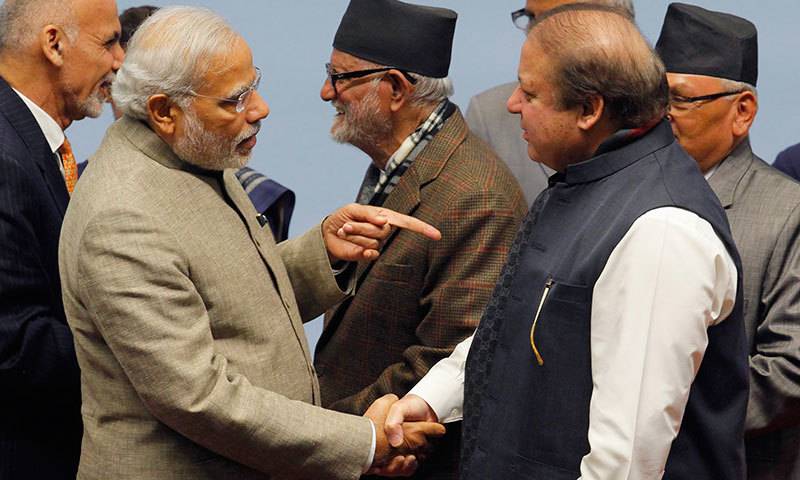Prime Minister Nawaz Sharif and Narendra Modi met today and nobody was as excited about as they were last year. The meeting, organized in the Russian industrial city of Ufa, was on the sidelines of a Shanghai Cooperation summit, where big players are China and Russia, while India and Pakistan are just observers with greater ambitions.
India-Pakistan ties are strained. The list of grievances and disagreements is lengthy and high-level talks have been called off. Border firing has resulted in civilian deaths and fraught verbal exchanges. The two premiers gave each other the cold shoulder in the last SAARC summit in Kathmandu. In April, the release of alleged Mumbai attacks mastermind, Zakiur-Rehman Lakhvi, heightened the tensions.
India’s cross-border raids in Myanmar was followed by callous remarks by PM Modi’s ministers, who implied that such strikes can be carried out in Pakistan as well. This irked Islamabad, understandably so.
PM Modi’s foreign policy enthusiasm has helped him outshine his own foreign minister. He spent 52 days of the first year of premiership abroad. Some big investments and political breakthroughs followed. Modi has demonstrated that he places relations with neighbors on a priority. India is promoting trade, establishing border infrastructure and regional electricity grid (particularly for hydropower), churning out aid (especially for Nepal after the earthquake) and relaxing visa policies. India evidently seeks to isolate Pakistan in the region by forming closer ties or sub-groups within the SAARC – a policy dubbed the “SAARC minus one.”
However, Modi is treading too cautiously towards Pakistan, so far giving only mixed signals. But if PM Modi wants to go down in history as a foreign policy genius, no miracle abroad can atone for a shoddy policy vis-a-vis Pakistan.
As Shivam Vij recently pointed in the DailyO that Indo-Pak talks have not always been fruitless in the past.
In 2003, talks led to lesser tensions at the Line of Control, a reduction in terrorism and eventually a more liberal visa policy.
I have been meeting Indians all over the world and have visited India twice. In the process, I have formed many warm and deep friendships. However, Indians often fall for the prevalent jingoism, and this has worsened since BJP has become popular. The sentimental chauvinist, high on the narrative from 1965 and still embittered by the division of India resurfaces. I am never surprised when ministers or college students openly suggest that India should bomb Pakistan. Unfortunately, some of them desire peace, but genuinely believe that India has lesser stakes in a war because its chances of winning it appear to be greater.
Just yesterday I came across one such blog on the “policy samvad” website which aims at “putting policy back in politics.” The blog started with a paragraph on Nawaz Sharif’s niece tying the knot with an Indian General’s grandson “recently.” This unverified news, planted before the 2013 general election has been denied by the Sharif family and never followed by mainstream media or their political opponents. When India lost this year’s World Cup cricket semi-final to Australia, many Pakistanis commented that “Shoaib Malik’s in-laws have been beaten by Waseem Akram’s.” This paragraph full of false information had the same logic behind it. This is sloppy journalism and non-starter if you want to “put policy back into politics.”
Though the writer did remove this paragraph, instead of realizing his mistake, the writer made personal attacks and ended by saying “you have spoken against Modi in the past, what right do you have to speak against our PM?” Of course, why criticize any Prime Minister for that matter? This self-righteous attitude is becoming painfully common. Imagine people calling you names online, just because you consider Modi’s yoga posture display a publicity stunt.
The ties between India and Pakistan are not just strained by the lack of clarity by Modi government, but also by this intolerant and brash attitude, which has become commonplace in India now.
The border tension is high, hardliners (like Hafiz Saeed) have a very safe ground in public discourse while meetings between the two countries are being avoided. The least anyone can do is not add chutzpah by using false news and realizing that peace is equally important on both sides of the border.
Mani Shankar Aiyar recently wrote a piece titled “What Modi has not recognized about Pakistan.”
The entire article is brilliant but the following lines hit home: “Pakistan and her people keep coming back, resolutely defeating sustained political, armed and terrorist attempts to break down the country and undermine its ideological foundations. That is what Jaffrelot calls its "resilience". That resilience is not recognized in Modi's India. That is what leads the Rathores and the Parrikars to make statements that find a certain resonance in anti-Pakistan circles in India but dangerously leverage the impact on Pakistani public opinion of anti-India circles in Pakistan. The Parrikars and the Saeeds feed on each other. It is essential that both be overcome.”
Above all, nobody owes you anything for maintaining peace in your own neighborhood- you do it for yourself and your own children.






